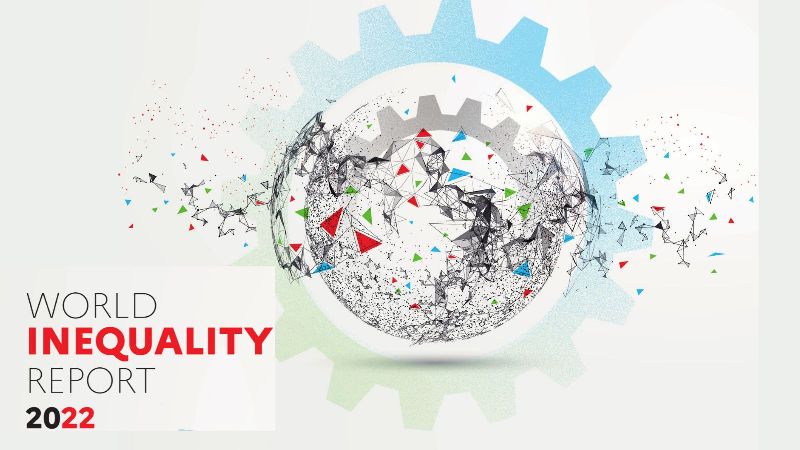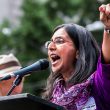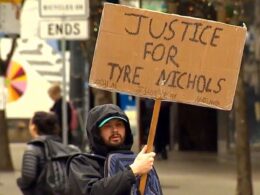By Eddie McCabe
The capitalist system is a crooked casino. Its inherent contradictions (including extreme inequality) produce recurring crises for which the capitalist classes are ultimately culpable, but which consistently result in more wealth for themselves at the expense of the working-class and poor majority. The Covid crisis is a perfect example, illustrated once again by data in the World Inequality Report 2022.
Take Elon Musk, currently the richest man in the world, who has seen his wealth increase tenfold during the pandemic; from $28 billion at the beginning of 2020, to over $278 billion at the end of 2021. He’s the most obscene example, but the crisis has been a bonanza for the super-rich as a whole. The collective wealth of the world’s 3,000 billionaires increased by $3.6 trillion in 2020 alone, which the ILO noted, contrasted with the $3.7 trillion in income lost by workers globally in the same period. And as the pandemic continues, with Omicron ushering a fourth wave, so does this trend of inequality in both health and wealth.
Extreme wealth inequality
The World Inequality Report (WIR), produced by 100 researchers over four years, shows the incredible disparities that exist in global income and wealth. The report found that in the last 20 years, “The gap between the average incomes of the top 10% and the bottom 50% of individuals within countries has almost doubled.” However, while inequality has risen more or less everywhere it hasn’t been uniform, which, the report correctly states, “confirm[s] that inequality is not inevitable, it is a political choice.”
On the whole, the wealthiest 10% of the world’s adult population today receives 52% of global income, while the poorest 50% – now nearly 3 billion people – receives just 8%. As far as wealth goes, the disparities are even more stark: the richest 10% own 76% of all wealth, meaning 90% of the world share less than a quarter. The poorest 50% has hardly any wealth at all, owning just 2% of the total.
The report highlights one particularly damning fact:
“Global inequalities seem to be about as great today as they were at the peak of Western imperialism in the early 20th century. Indeed, the share of income presently captured by the poorest half of the world’s people is about half what it was in 1820, before the great divergence between Western countries and their colonies.”
In other words, 200 years of capitalism has left the poorest half of the world with 50% less income share. An abysmal failure by any standards.
Decades of neoliberalism
Four decades of neoliberal ideology dominating economic policy globally has clearly left its mark. Privatisation and cuts to public services and assets, as well as periodic crises in which the state borrows to bail out banks and corporations deemed ‘too big to fail’, has meant that:
“Over the past 40 years, countries have become significantly richer, but their governments have become significantly poorer. The share of wealth held by public actors is close to zero or negative in rich countries, meaning that the totality of wealth is in private hands. This trend has been magnified by the Covid crisis, during which governments borrowed the equivalent of 10-20% of GDP, essentially from the private sector.”
The vital role of state intervention was highlighted by the pandemic, in which trillions were spent by governments (the Irish state spent €24.6 billion in 2020) on measures related to the Covid crisis, particularly on income support. Faced with another emergency on that scale – and multiple potential ones loom – the ability of states to respond in the same way will be inhibited by these trends, especially with governments in power that refuse to take wealth back from the billionaires and big business.
Climate impact
The inequality in the world today is extreme, and damaging in some very obvious ways. Like the fact that over 1 billion people live in slums, or that 690 million go hungry and 25,000 people die every day from hunger and hunger-related diseases.
But this inequality is the source of other, perhaps less obvious problems, such as the warming of the planet through the release of CO2, for which the richest are most responsible. The report finds that the richest 10% are responsible for nearly 50% of all emissions, with the poorest 50% responsible for 12%.
And these disparities are found not just between wealthy countries and poorer countries, but also between the rich and poor within those countries. In Europe, the bottom 50% of the population emits around five tonnes per year per person, while the top 10% emits 29; the bottom 50% in East Asia emits around three tonnes, while the top 10% emits 39; and the bottom 50% in North America emits around 10 tonnes, and the top 10% a staggering 73 tonnes!
As the report observes: “Large inequalities in emissions suggest that climate policies should target wealthy polluters more. So far, climate policies such as carbon taxes have often disproportionately impacted low- and middle-income groups, while leaving the consumption habits of wealthiest groups unchanged.”
Taking the wealth
The WIR concludes from all of its analysis that what’s needed is a redistribution of wealth through “modest progressive taxes… in order to meet the challenges of the 21st century”, particularly “in education, health and the ecological transition.” Specifically it suggests a 1% wealth tax on millionaires (all 62 million of them), which alone would generate $1.7 trillion. It also suggests the idea of a one-off tax on the excess wealth made by billionaires in 2020, the $3.6 trillion referred to above, which if spent on healthcare “would almost double global healthcare spending in a year.”
These are indeed modest proposals, but if actually implemented they could have a profound effect on the lives of the working class and poor globally. The problem, however, is that even these modest proposals will simply not be implemented by the capitalist governments and institutions around the world that represent the interests of the billionaires and big business – and protect them from precisely these policies. Only an organised and mass movement of the working class in each county and internationally, could force such wealth redistribution.
But the issue is not just one of resources, of which there are plenty, and socialists would advocate far more radical measures than the above; it’s primarily one of ownership and control. An extra $5 trillion in the hands of the world’s capitalist regimes, even if mandated to be used on public services, would eventually find its way back to the capitalists one way or another. That’s what capitalist states are there for.
Only by the working class taking control of the wealth, and democratically planning its use to meet the needs of all people and the planet, could inequality really be ended. Such a socialist alternative is not just possible, but urgently needed – for the sake of all people and the planet. On this question the WIR falls short, but it’s findings are useful even if not particularly revelatory.











